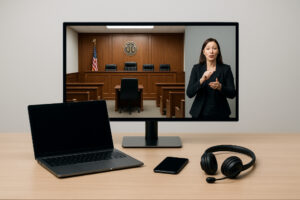Workers’ compensation hearings often involve complex legal terminology, sensitive claims, and diverse participants. When those hearings go remote, primarily through platforms like video remote interpretation (VRI), language access becomes both a challenge and a priority.
At Atlas Language Services, Inc., we understand how critical clear communication is during legal proceedings, especially for injured workers navigating unfamiliar systems. Based in Chicago and serving clients worldwide, we specialize in high-quality remote interpretation for legal hearings, medical consultations, and insurance claims. If you’re seeking dependable legal interpreting services, learn more about how we can support your next hearing.
Understanding the Remote Interpretation Landscape
 Remote interpretation typically involves phone or video remote interpreting, especially during workers’ compensation hearings. While both options offer flexibility, VRI provides visual cues essential for interpreting sign language and reading nonverbal signals, often necessary in court-adjacent environments.
Remote interpretation typically involves phone or video remote interpreting, especially during workers’ compensation hearings. While both options offer flexibility, VRI provides visual cues essential for interpreting sign language and reading nonverbal signals, often necessary in court-adjacent environments.
Whether you’re a claimant, legal representative, healthcare provider, or insurer, relying on professional interpreters trained for legal and medical settings is a must. These aren’t just services, they’re lifelines that ensure every participant understands the claim process, legal obligations, and hearing outcomes.
Choose the Right Platform and Device
Not all digital tools are created equal. A stable VRI session requires reliable software and appropriate hardware. Whether using a laptop, desktop, tablet, or mobile device, confirm that the browser and system meet compatibility requirements for secure video calls.
- Tip: Conduct a tech check before the appointment. Ensure the connection is strong and the device’s camera and microphone are working correctly.
- Mobile backup: If the primary device fails, having a smartphone or tablet ready can save the day.
Match Interpreter Expertise to the Hearing Type
Legal proceedings, especially compensation claims, demand interpreters trained in legal terminology, privacy policies, and workers’ compensation standards. This is doubly important when the hearing involves American Sign Language (ASL) or less common languages.
- Use qualified interpreters with valid licenses and experience in legal settings.
- Customization counts: Assign interpreters based on the nature of the injury, language pair, or hearing complexity.
Prioritize Privacy and Compliance
Remote interpretation must meet the same confidentiality and security standards as in-person services. That means encrypted platforms, secure file sharing for document review, and a quiet, private space for interpretation.
- Ensure HIPAA and court compliance, especially when patient data or injury details are discussed.
- Limit participant access to only those necessary for the hearing, no exceptions.
Train Staff and Participants Ahead of Time
Participants unfamiliar with VRI can unintentionally delay proceedings or compromise communication quality. Provide guidance on how to connect, mute/unmute, and interact with interpreters before the hearing.
- Offer short tutorials or prep sessions for both staff and clients.
- Provide written guides in multiple languages if possible.
Create an Environment for Success
Remote doesn’t mean casual. A professional setup helps interpreters focus and ensures claimants feel respected and understood.
- Use a neutral background and adequate lighting.
- Mute distractions. Phones, notifications, and unrelated apps.
- Request participants wear headsets to reduce background noise.
Always Have a Backup Plan
Interpreters, representatives, and injured workers alike face digital hiccups. From dropped connections to software glitches, things can go sideways quickly.
- Build in extra time for tech issues.
- Have contact numbers ready in case switching to phone interpreting becomes necessary.
- Keep an on-site interpreter or local contractor on standby, especially for high-stakes hearings.
Clarify Roles and Expectations
Before the session starts, make sure everyone knows the interpreter’s role. They’re not advocates, advisors, or decision-makers. Their job is to provide accurate, unbiased communication between parties.
- Set ground rules for turn-taking and speaking pace.
- Let interpreters know if a participant has cognitive, hearing, or other challenges that may affect communication.
Conclusion
Workers’ compensation hearings are stressful enough. Add in language barriers and a remote setup, and the risks of misunderstanding grow. That’s why it’s critical to follow best practices in remote interpretation – whether the hearing takes place on a laptop in a law office, a desktop in a hospital, or a tablet at home. Atlas Language Services, Inc. is here to support you with experienced legal interpreters, global availability, and a commitment to accurate, human-first communication.
Need dependable interpreting services for your next workers’ comp hearing?
Reach out to Atlas Language Services, Inc., because when it comes to your clients, clarity isn’t optional.
FAQs
Can remote interpreters handle workers’ comp medical exams and hearings?
Yes. Professional interpreters are trained to handle both the legal and medical aspects of workers’ compensation claims, ensuring clear communication throughout the process.
What’s better for legal hearings: phone or video remote interpreting?
Video remote interpreting (VRI) is usually preferred – it captures nonverbal cues and is essential for sign language. Phone interpreting can be a backup, but visuals matter in court-related settings.
How do I make sure the interpreter is qualified for a legal hearing?
Work with agencies like Atlas Language Services, Inc. that vet all interpreters for legal and medical expertise. Ask for credentials or licensing documentation when needed.
What if someone loses connection during a remote hearing?
Have a secondary device or contact method available. Most interpreting services can seamlessly switch to a phone interpreter or reschedule if the issue persists.

